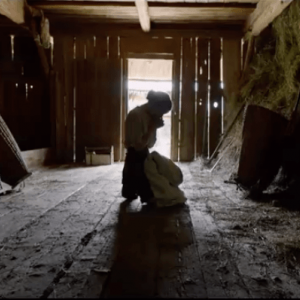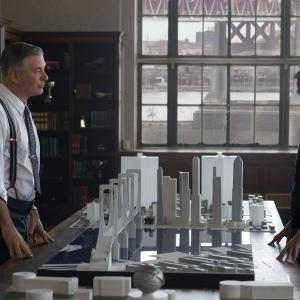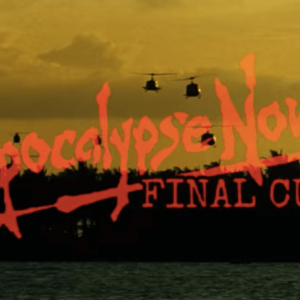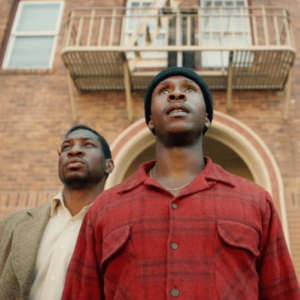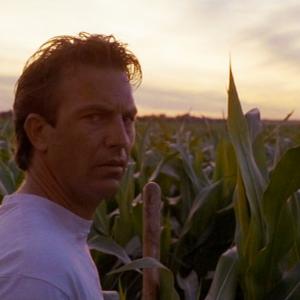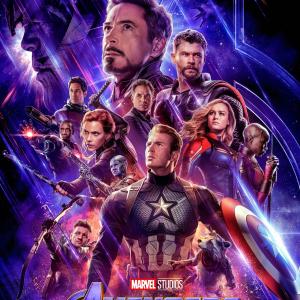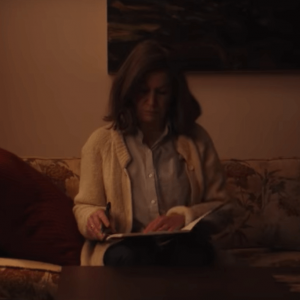
Gareth Higgins (garethhiggins.net) is a writer and broadcaster from Belfast, Northern Ireland, who has worked as an academic and activist. He is the author of Cinematic States: America in 50 Movies and How Movies Helped Save My Soul: Finding Spiritual Fingerprints in Culturally Significant Films. He blogs at www.godisnotelsewhere.wordpress.com and co-presents “The Film Talk” podcast with Jett Loe at www.thefilmtalk.com. He is also a Sojourners contributing editor. Originally from Northern Ireland, he lives in Asheville, North Carolina.
Posts By This Author
Men's Love and Grief in ‘The Inheritance'

Photo via The Inheritance on Facebook
In The Inheritance, currently on Broadway through mid-March, a century-old English novel (E.M. Forster’s Howards End) gently soundtracks, or perhaps orchestrates, the lives of gay men in their 30s during the period when President Obama was moving out of office, President Trump was moving in, and many of us wondered just where on earth we were.
Academy Proves Again Oscars Don't Represent Cinema's Greatest Achievements
There’s no such thing as an objective critic, or objective criteria by which any of us could judge a movie. The question is whether the critic, or the audience, is able to be honest about the criteria they are using. So I’ll say something I’ve said before: By my sights, the purpose of art is to help us live better, and the best cinema occurs when technical and aesthetic craftsmanship operating at their highest frequencies, and a humane concern for the common good, kiss each other.
The Odd Weightlessness of 'The Rise of Skywalker'
Contains mild spoiler.
Let’s start with what works.
The Best Films of 2019
In 2019, a good handful of movies left me feeling elevated; better still, the most joyful films of the year were also among the wisest.
'The Irishman' Is a Gangster Film About the Emptiness of Violence
A door closing tight, shutting out an image of a man sitting on an elegant chair, taking the hand of a subordinate: a firm instruction to keep out. Another door half-open, behind which another man in physical decline sits, alone and afraid of the dark. Two cinematic perspectives on two doors. The first forms the conclusion of Francis Coppola's The Godfather, as Michael Corleone is effectively enthroned as a demonic king. The other may become comparably iconic, as Martin Scorsese's The Irishman’s Philadelphia mobster Frank Sheeran does the most he can to feel regret, to feel anything, after a life of theft, killing, and nihilism masquerading as protecting the ones he loves.
'Motherless Brooklyn' Asks: What's Important Enough to Devote a Life To?
Motherless Brooklyn, writer-director-star Edward Norton’s adaptation of Jonathan Lethem’s 1999 novel, is confident enough in its own scope to begin with Shakespeare, and it certainly backs up this confidence with an argument. A quotation from Measure for Measure invites us to reflect on the nature of power: “O! It is excellent to have a giant’s strength, but it is tyrannous to use it like a giant.”
Who Gets to Play God? Revisiting 'Apocalypse Now'
A clear-eyed viewing demands lament for the suffering caused by war.
‘The Last Black Man in San Francisco’ and Loving a Complicated City
The Last Black Man in San Francisco is a film of operatic intensity, poetic emotion, political clarity, and a touch of magic realism.
Eight Thoughts About ‘Field of Dreams,’ 30 Years After its Release, by Someone Who's Seen It 23 Times
The promise of Field of Dreams is that when we give ourselves to serving the common good at the place where our “deep gladness and the world’s hunger meet,” as Frederick Buechner writes, we don’t just help advance the healing of the people we touch, we also begin to heal our pain.
The Unlikely Romance and Politics in 'Long Shot'
There are moments in Long Shot, the new comedy in which Charlize Theron and Seth Rogen fall for each other, save the country from dehumanizing polarization, and (maybe) the planet from dehumanized humans, in which I wondered if I was watching something as good as Tootsie. It’s really easy to make a slapstick joke, but really hard to integrate dozens of them into a coherent work (there’s a reason the Marx Brothers don’t have many heirs); and it’s even harder to weave comic tropes into a story that also manages to feel like real life.
'Hail, Satan?' Digs Beneath Religious Freedom Debates
It turns out that The Church of Satan as founded by Anton LaVey was more of a hedonistic club than something to fear, and today’s The Satanic Temple (TST) an entirely distinct organization — an emerging religious community whose tenets are dedicated to compassion, making amends for mistakes, and promoting religious liberty.
Pivoting Between Truth and Avoidance in 'Avengers: Endgame'
It’s rare for large-scale action movies to attempt to meaningfully show the aftermath of destruction; the human realities of both one individual family, and entire nations are conveyed in those opening minutes. It feels … truthful? Alas, after that, Avengers: Endgame spends almost three hours pivoting between giving the truth and avoiding it.
Film’s Decade of Change
Looking back at how movies have transformed for the better.
WHEN I STARTED writing this column a decade ago, the Oscars were about to address The Dark Knight not being nominated for Best Picture by expanding from five to 10 possible nominees. Only two Marvel Universe movies had been released, iPads didn’t exist, movies were still mostly shot on film, and #MeToo wasn’t known outside activist circles.
Today, as I write my final regular column for the magazine, the expanded nominations system has delivered one of the least plausible Best Picture awards in memory (Green Book), 22 Marvel movies have been released, people make films on iPads, watching cinema on a phone is second nature, and a new era of respect and accountability is dawning in the entertainment industry and elsewhere.
In 'High Life,' Repetition Is a Death Sentence
You don’t have to be in prison to recognize the power dynamics among the characters and how their bored desperation could remind us of what happens when the most emotionally unhealthy habits of mind mingle with the least human technologies. You don’t have to launch into space to find yourself clicking a button over and over and over, the offer of immediate gratification without genuine connection. It’s no wonder that the most psychologically mature astro-prisoner (played by André Benjamin) takes to sleeping in the garden — it’s the closest thing to real.
'Diane' Reveals the Roads We Travel As We Look For Community
What lingers most after seeing Diane, a wise, sad, and beautiful film, and the best reason to go to the movies this week, is the roads. The title character, anchored in an immersive performance by Mary Kay Place, is always driving - from her house to the extended family who josh and complain and hold each other up, from there to the apartment where her son is failing to hide his problems, from there to the deathbed of a dear friend with whom she has a complicated history, from there to the church soup kitchen where she serves.
'Mary Magdalene' Attempts a Deeper Look at the 'Apostle to the Apostles'
In the newest cinematic Mary Magdalene, directed by Garth Davis from a script by Helen Edmundson and Philippa Goslett, Mary isn’t confused at all. I don’t think anyone was expecting a film with that title to appear unironically in 2019; it's also a genuine surprise that it wasn’t made for the Christian market, nor does it aim for the kind of dry, “noble” distance that makes large-scale biblical epics such as Ben-Hur seem like Downton Abbey, upstairs, with sandals. The fact that Mary Magdalene contains decent performances (especially Rooney Mara’s Mary, not a doe-eyed holy innocent, but a leader who finds her voice by speaking), and makes an honest effort at exploring the less familiar parts of one of the most familiar stories in history makes it worth our attention. That attention may even be rewarded by an idea or two. It’s thoughtful, honest, yet not earth-shattering cinema, although it does bring its own revelation.
An Invitation to Change
How ‘Faces Places’ teaches us to see miracles.
SOMETHING WONDERFUL is happening in popular cinema: a new psychological depth married to kinetic technique that seems to emerge from filmmakers’ willingness to show their vulnerability. Notice how First Man is far more than a moon landing epic; it’s massively about the heart. Blindspotting takes racism more seriously than it takes itself. And Leave No Trace doesn’t settle for catharsis but invites us to do something in response to the brokenness on screen. There are dozens more films like this.
The psychological depth and open vulnerability of these films are mirrored in the way we talk about movies. It’s easy to find good film criticism that tells us about the writer’s life, and conversation about how cinema interacts with the world is no longer exclusively an elitist game.
But our favorite films don’t just tell us what we think about the world: They tell us something about what we think of ourselves. If what we pay attention to shows us what we love, it may also show us what we allow to love us. It bears exploration: What do our favorite films say about who we are, who we want to be, how we see the world, and what we feel we deserve? What are they inviting us to become?
Rolling With the King
The good and bad of Eugene Jarecki’s film, ‘The King’ about Elvis Presley.
THERE ARE moments in The King—Eugene Jarecki’s ambitious movie about how the rise and decline of Elvis Presley is a metaphor for America—when the film feels like a prophetic lament. Striking widescreen photography frames an original idea: taking the Rolls Royce that Elvis owned on a nationwide road trip, picking up hitchhikers and celebrities alike to talk about what went wrong.
Parts of it are brilliant: Chuck D lamenting how Elvis appropriated black music and ended up being coronated while “Big Mama” Thornton (for whom Leiber and Stoller wrote “Hound Dog”) remained a marginal figure; John Hiatt gently weeping in the back of the Rolls, his heart heavy at how Elvis “was so trapped”; the housekeeper who found Elvis half-dead on the toilet, and the women who live in one of his early homes, briefly centering the stark contrast between a 20th-century king and 21st-century poverty.
It’s brave and imaginative to include footage of Jarecki’s interviewees criticizing him and the film itself. The Wire creator David Simon says it would have been better to use one of Elvis’ Cadillacs—a more apt metaphor for American decline than the car of a British aristocrat. More challenging is Van Jones asking why Jarecki seems to defend a man who took the music of descendants of enslaved people, accrued enormous power for himself, and didn’t speak up when the nation needed public figures to support civil rights.
Goodness and Mercy
On Aquaman, Jesus, and Willem Dafoe.
WILLEM DAFOE is my favorite onscreen Jesus, and since The Last Temptation of Christ’s release three decades ago, he’s been indelibly associated with that role. His Jesus was a corrective to the over-mysticized versions in epics such as Ben-Hur and The Greatest Story Ever Told, which portray Jesus as a kind of magician instead of a person.
Dafoe’s Jesus (which is also the Jesus of novelist Nikos Kazantzakis and Paul Schrader, who adapted Kazantzakis’ work for the screen) is a serious attempt at grappling with the human questions his story demands. This Jesus is a breathing, sweating, sleeping, dancing, agonizing, raging Jesus: a political Jesus who prefers a donkey to a revolution; a compassionate Jesus who struggles to figure out his own needs amid the burdens of the world; a thinking Jesus who doesn’t emerge from the womb with a fully formed philosophy but learns by experience, scripture, and prayer.
Fictionalized Jesuses are, of course, like any other Jesus: We see all the Jesuses we’ve ever met through the lens of our own experience. The light of Willem Dafoe’s Jesus (not to mention his astonishing portrayal of Vincent van Gogh in the recent masterpiece At Eternity’s Gate) is more useful to me than the “magician” versions because I’m not sure I can learn much from superheroes.
Faith, Justice, and the Best Films of 2018
From cinematic moments showcasing social inequality to Christ-like love.
BEFORE WE GET to the best movies of 2018, let’s talk about the most memorable moments of this year in cinema. Neil Armstrong casting his daughter’s bracelet into a canyon on the moon in First Man, a story as much about one person’s grief and desire to connect with another as about our species’ ambition and desire to conquer the final frontier.
The dawning realization, in What They Had, of why Robert Forster steps out of the bedroom he has shared with Blythe Danner for 60 years, sparing her more suffering and loving her until the end.
A deceptively simple scene—a conversation in a car going from one neighborhood to another—that’s a revelation of social inequality and how near yet far we live from each other. In minutes, Widows covers centuries of relationships of power.
An unexpected funeral in The Gospel of Eureka that breaks the audience’s heart and calls forth our loves.
And the titular character Christopher Robin, who holds Pooh Bear’s hand as they walk through a field, as though Terrence Malick is directing the film.


